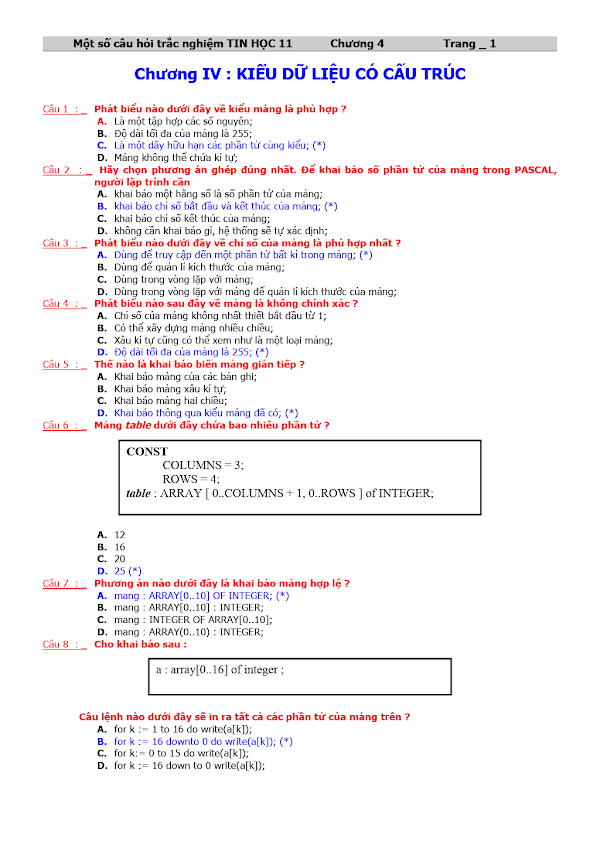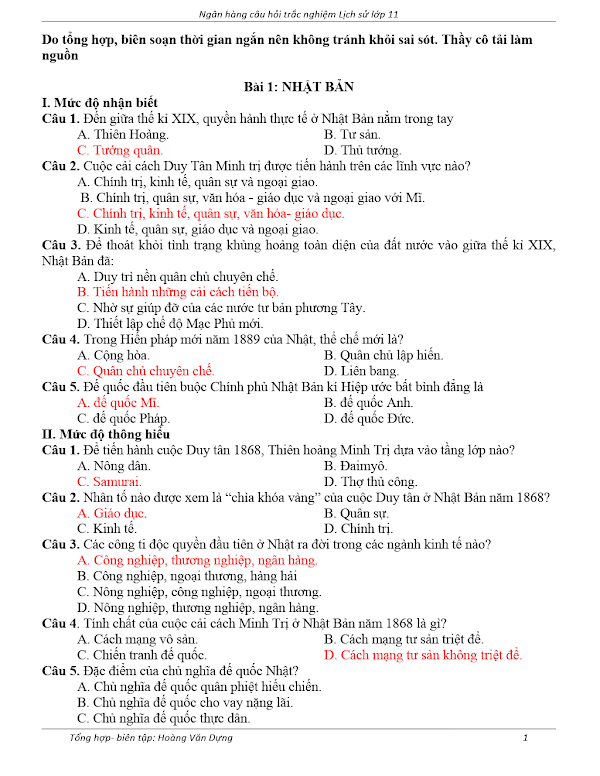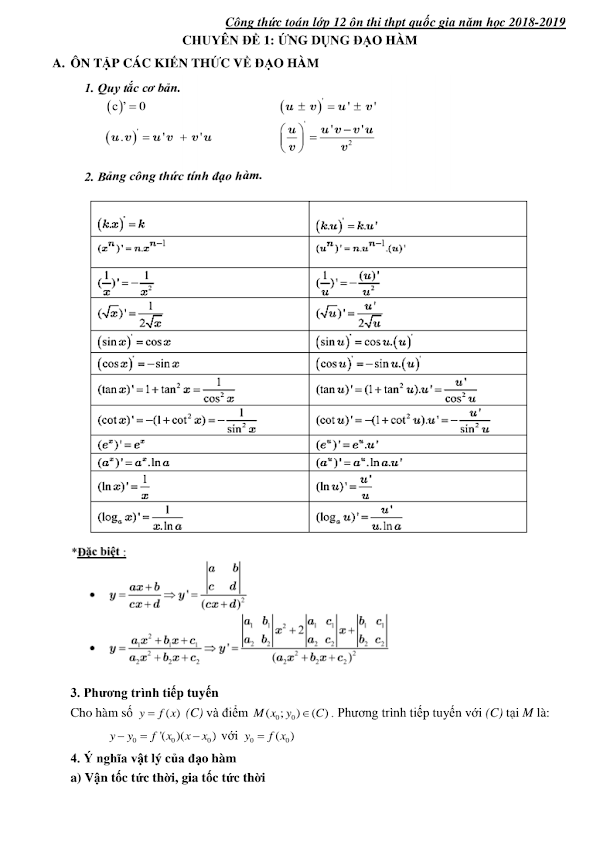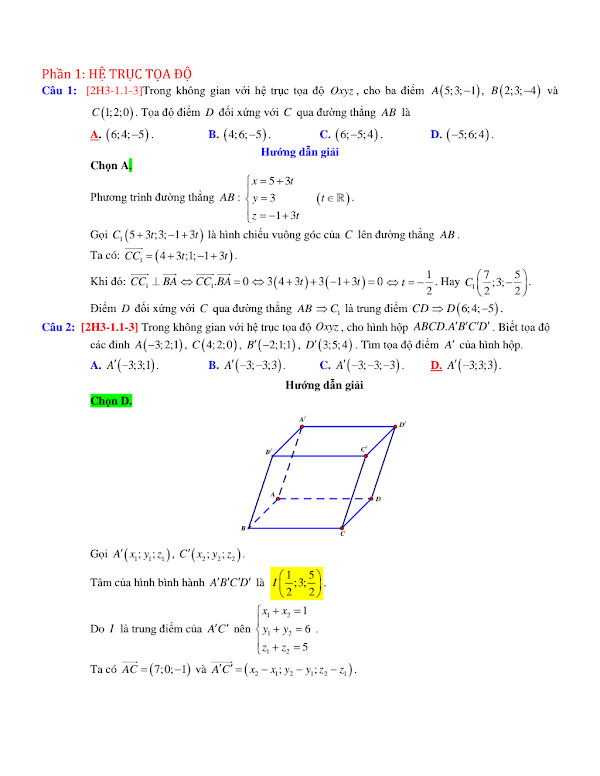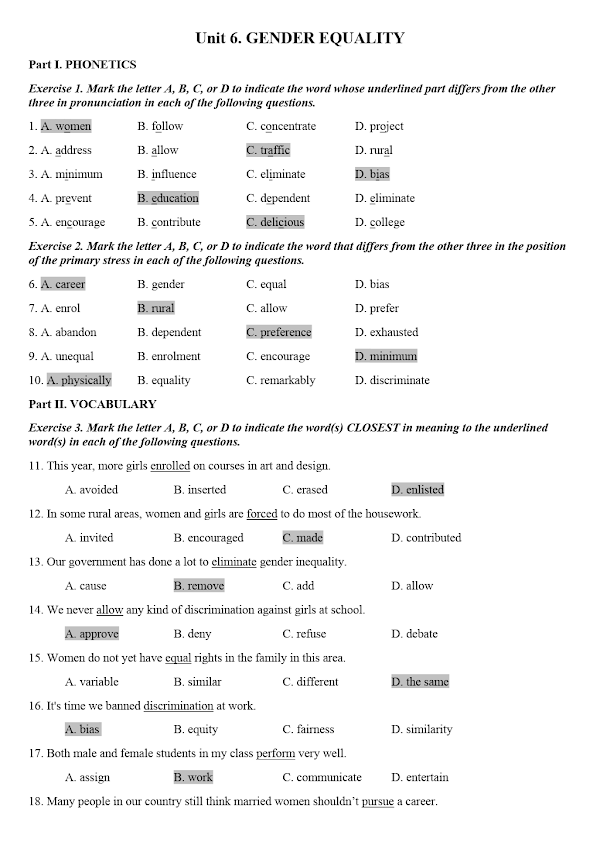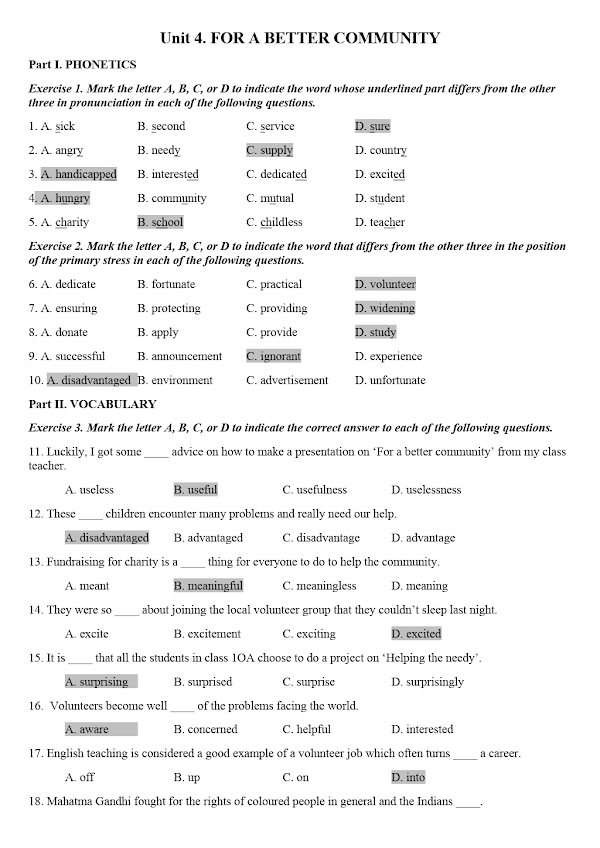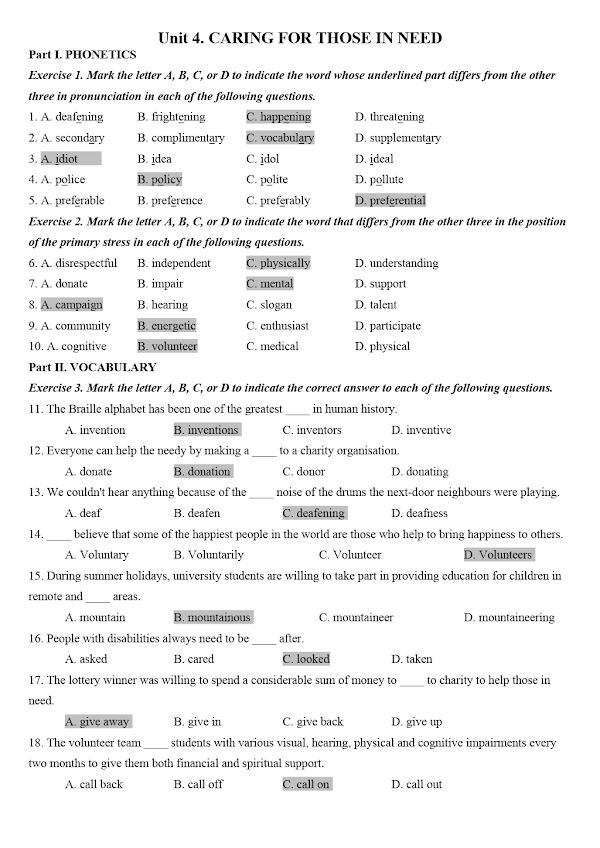Bài tập unit 8: New ways to learn - Tiếng Anh lớp 10
Chào các bạn học sinh và quý thầy cô, hôm nay LogaVN gửi tới bạn đọc tài liệu "Bài tập unit 8: New ways to learn - Tiếng Anh lớp 10". Hi vọng sẽ giúp ích cho các bạn học tập và giảng dạy.
BÀI TẬP ANH 10 THÍ ĐIỂM
UNIT 8 ~ NEW WAYS TO LEARN
Part I. PHONETICS
Exercise 1. Mark the letter A, B, C, or D to indicate the word that differs from the other three in position the of the primary stress in each of the following questions.
1. A. digital B. personal C. excellent D. electric
2. A. similar B. symbolic C. effective D. eternal
3. A. successful B. cognitive C. different D. wonderful
4. A. efficient B. exciting C. distracting D. portable
5. A. convenient B. permanent C. attractive D. important
6. A. modernize B. organize C. indicate D. continue
7. A. graduate B. develop C. consider D. enable
8. A. concentrate B. benefit C. understand D. mobilize
9. A. introduce B. stimulate C. recognize D. emphasize
10. A. exercise B. volunteer C. calculate D. interview
Part II. VOCABULARY
Exercise 2. Mark the letter A, B, C, or D to indicate the correct answer to each of the following questions.
11. Personal....devices are useful for learning.
A. electric B. electrical C. electronic D. electronical
12. They’re excellent learning.....You can store information, take notes, write essays and do calculations.
A. equipments B. tools C. gadgets D. techniques
13. In English class yesterday, we had a discussion....different cultures.
A. around B. about C. for D. from
14. Mrs Dawson said that we were....our lesson in the library next Monday.
A. having B. making C. reading D. going
15. I really don’t....the point of taking the exam when you are not ready for it.
A. take B. have C. mind D. see
Thẩm Tâm Vy, Oct 4th, 2020 BÀI TÂP ANH 10 THÍ ĐIỂM ~ UNIT 9
BÀI TẬP ANH 10 THÍ ĐIỂM
UNIT 8 ~ NEW WAYS TO LEARN
Part I. PHONETICS
Exercise 1. Mark the letter A, B, C, or D to indicate the word that differs from the other three in position the of the primary stress in each of the following questions.
1. A. digital B. personal C. excellent D. electric
2. A. similar B. symbolic C. effective D. eternal
3. A. successful B. cognitive C. different D. wonderful
4. A. efficient B. exciting C. distracting D. portable
5. A. convenient B. permanent C. attractive D. important
6. A. modernize B. organize C. indicate D. continue
7. A. graduate B. develop C. consider D. enable
8. A. concentrate B. benefit C. understand D. mobilize
9. A. introduce B. stimulate C. recognize D. emphasize
10. A. exercise B. volunteer C. calculate D. interview
Part II. VOCABULARY
Exercise 2. Mark the letter A, B, C, or D to indicate the correct answer to each of the following questions.
11. Personal....devices are useful for learning.
A. electric B. electrical C. electronic D. electronical
12. They’re excellent learning.....You can store information, take notes, write essays and do calculations.
A. equipments B. tools C. gadgets D. techniques
13. In English class yesterday, we had a discussion....different cultures.
A. around B. about C. for D. from
14. Mrs Dawson said that we were....our lesson in the library next Monday.
A. having B. making C. reading D. going
15. I really don’t....the point of taking the exam when you are not ready for it.
A. take B. have C. mind D. see
16. If the examiner can’t....sense of your writing, you’ll get a low mark.
A. take B. bring C. make D. understand
17. I would prefer to go to university and do a....in International Studies, rather than start work.
A. certificate B. result C. degree D. qualification
18. My dad wants me to go university, but I’m in....minds about it.
A. my B. two C. some D. different
19. Most computers have enough....to store a vast amount of information.
A. database B. document C. memory D. word processor
20. You can’t get into the Internet unless your computer has a(an).....
A. access B. terminal C. web page D. modem
21. Many people only use their computer as a.....All they do is to write letters and reports on it.
A. word processor B. template C. document D. spreadsheet
22. The World Wide Web is made up of millions of....created by anybody from multi-media corporations to ordinary people like you and me.
A. newsgroups B. chatrooms C. users D. sites
23. On the web you can read....newspapers or magazines; you can watch videos, download music or buy anything.
A. virtual B. online C. digital D. offline
24. When I first started learning English ten years ago, I could hardly....a word - "hello”, “goodbye”, “thank you” was just about it!
A. speak B. talk C. say D. tell
25. I went to classes two evenings a week and I was surprised at how quickly I....progress.
A. had B. made C. did D. produced
26. I....a lot of new language from speaking with my host family and with other students from all over the world.
A. picked up B. took up C. made up D. saved up
27. Helen is much more confident with her English now. She can actually....a conversation with her teacher in English without difficulty.
A. keep B. do C. improve D. hold
28. If you're not sure what something means,....in your dictionary or use your electronic dictionary for help.
A. check up B. look up C. translate D. interpret
29. Whenever you hear a new word that you think is important,....in your notebook.
A. keep it down B. put it down C. write it down D. spell it down
30. She had to....her First Certificate Exam three times.
A. study B. take C. make D. do
31. I'm....for my English test tomorrow.
A. focusing B. meditating C. remembering D. revising
32. He'll have to....and work harder or he'll fail the exam.
A. pull his socks up B. polish his head
C. empty his washing basket D. stick his neck out
33. Sally always hands in her homework on time and buys the teacher small presents.The other children hate her. She's such a.....
A. teacher's toy B. teacher's jewel C. teacher's pet D. teacher's sweet
34. Electronic devices are bad for your eyes, and....from electronics could harm your body and cause permanent damage.
A. wave B. radiation C. radiator D. emission
35. Like children elsewhere, children in the US have greatly benefited....modern technology.
A. of B. from C. in D. with
Exercise 3. Mark the letter A, B, C, or D to indicate the word(s) CLOSEST in meaning to the underlined word(s) in each of the following questions.
36. You can download free lessons and put them in your media player or other similar mobile devices. Then you can listen and study anywhere because these devices are portable.
A. affordable B. available C. feasible D. carriable
37. Personal electronic devices which distract students from their classwork are banned in most schools.
A. forbid B. prohibit C. divert D. neglect
38. Permanent damage to children's body may be caused by frequent contact with electronic devices.
A. Immediate B. Long-lasting C. Short-term D. Serious
39. If your smartphone rings in class, it will be very annoying and disruptive.
A. interruptive B. supportive C. discouraging D. confusing
40. For very young children, electronic devices may help promote listening and speaking skills.
A. advertise B. popularize C. discourage D. improve
41. Students who have access to inappropriate information, videos and pictures may spend many hours reading and watching, and forget about their projects or assignments.
A. fascinating B. tempting C. unsuitable D. illegal
42. People whose work involves using a computer for most of the day may suffer from chronic headaches.
A. suggests B. includes C. means D. contains
43. One advantage of learning going digital is that students no longer have to carry the weight of papers and textbooks with them to school.
A. online B. electric C. computer-based D. modernized
44. An interactive whiteboard is an electronic device that helps students learn English in a more stimulating way.
A. interest-arousing B. performance-enhancing
C. communication-promoting D. proficiency-raising
45. This new invention is useful in the classroom because it can engage students and provide them with opportunities to communicate meaningfully.
A. pull B. attract C. encourage D. participate
Exercise 4. Mark the letter A, B, C, or D to indicate the word(s) OPPOSITE in meaning to the underlined word(s) in each of the following questions.
46. In my country, it is compulsory to go to school between the ages of five and sixteen.
A. necessary B. essential C. optional D. selective
47. Do you think that you pay enough attention in class? What have I been talking about?
A. neglect B. care C. notice D. consideration
48. Electronic dictionaries are now common in English classes. They can be very easily downloaded into your personal electronic devices.
A. individual B. public C. private D. possessive
49. Being able to use computers and the Internet can lead to an improved quality of life.
A increased B. enhanced C. promoted D. deteriorated
50. It seems unthinkable today not to provide children with a decent education.
A. sufficient B. adequate C. deficient D. proper
Part III. GRAMMAR
Exercise 5. Mark the letter A, B, C, or D to indicate the correct answer to each of the following questions.
51. “Who's that over there?" ~ "Oh, it's our new teacher,....just started work today."
A. that B. who he C. which he D. who
52. "Which CD did you get Marcus in the end?" ~ "I got him the one....said he really wanted to hear."
A. that B. who he C. whose D. which he
53. “Who did you send a Valentine's card to?" ~ "I'm not telling you, but it was someone....name begins with ‘B’.”
A. which B. who her C. whose D. whose her
54. "Have you seen Jason Green's latest film?" ~ "Is that the one in....joins the FBI?”
A. which he B. that he C. whom he D. which
55. "Why do you like Tania so much?” ~ “Well, she's one of the few people to....I can really talk."
A. which B. whom C. that D. who
56. "Why don't we go to Lionel's for dinner tonight?” ~ “Is that the new restaurant....has just opened on the other side of town?"
A. which B. where C. that it D. which it
57. "Could you lend me some money?" ~ "I'd like you to give me one good reason....I should."
A. that B. which C. why D. who
58. “What do you want to do this summer?” ~ “I think we should go somewhere....has plenty of sun and sand."
A. who B. where C. when D. that
59. Smartphones, laptops and tablets are the modern devices....have changed the way we think.
A. what B. Ø C. whose D. that
60. Students use smartphones to record their phone calls,....they later share with the class.
A. Ø B. that C. which D. whose
61. A tablet is perfect for people....work is to draw and write.
A. who B. Ø C. which D. whose
62. You can access the Internet, download programs and information....can help you understand the material and widen your knowledge.
A. what B. that C. Ø D. who
63. There are sites....you can record your own voice and listen to yourself.
A. where B. when C. that D. which
64. My teacher,....has been teaching for 25 years, finds it hard to make use of electronic devices in her teaching.
A. she B. who she C. who D. whose
65. That media player,....I often use to practise my English, has some great apps.
A. Ø B. that C. what D. which
66. The interactive whiteboard involves students directly in work in front of the board,....most of them love.
A. that B. Ø C. which D. whose
67. Qualifications are exam results....prove you have reached a certain level.
A. which B. Ø C. that D. Both A and C
68. In the USA, a public school is a state school,....is run by the government and is free to attend.
A. that B. which C. who D. Ø
69. This is the book in....Foster describes his experience of the war.
A. that B. what C. where D. which
70. Isn't that Tim, the boy....father owns a huge yacht?
A. whose B. his C. which D. that
71. Tina gave her ticket to the concert to John,....then sold it to Nick.
A. which B. he C. who D. whom
72. “Which cinema did you go to?” – “The one they don't sell any popcorn!"
A. which B. where C. whom D. who
73. That's the actor....autograph I got last year.
A. whose B. who C. who’s D. whom
74. The book....she's most famous is Dance of the Dinosaur.
A. in that B. to whom C. for which D. that
75. Student social life revolves around the Student Union,....is the large yellow building opposite the library.
A.Ø B. which C. that D. it
76. Mr Forbes teaches a class for students....native language is not English.
A. which B. who C. whose D. those who
77. I have just found the book.....
A. you were looking for B. which you were looking
C. for that you were looking D. you were looking
78. I don't understand the assignment....the professor gave us last Monday.
A. which B. that C. Ø D. All are correct
79. Students....get below-average exam results do not have the best prospects.
A. whose B. who C. Ø D. All are correct
80. I live in a dormitory....residents come from many countries.
A. where B. which C. in where D. whose
Exercise 6. Mark the letter A, B, C or D to indicate the underlined part that needs correction in each of the following questions.
81. Before I (A) came to England, I (B) hadn't had the opportunity to (C) speak to people (D) their native tongue is English.
82. No one (A) has said (B) anything (C) would persuade me (D) to change my mind.
83. The woman (A) sitting on the red chair (B) is the person (C) to who you (D) must give this envelope.
84. (A) There are some teachers in our school (B) try (C) to improve the quality of teaching by (D) making use of hi-tech devices.
85. Modern children, (A) who lives have become (B) more and more dependent (C) on electronic devices, find the traditional way of teaching very (D) dull and boring.
86. Smartphones and (A) tablets (B) which can be (C) used as effective (D) learning tools for children.
87. What (A) is the name of (B) the girl (C) that her mobile phone (D) was stolen.
88. A (A) tablet is a (B) mobile computer (C) is also (D) useful for language learning.
89. (A) Those want to (B) improve their English can download free (C) digital lessons from the Internet (D) to study.
90. (A) Mr Peterson who (B) has worked for the same school (C) all his life, (D) is retiring next month.
Part IV. SPEAKING
Exercise 7. Mark the letter A, B, C, or D to indicate the correct response to each of the following exchanges.
91. “.........” . “It means go very quickly.”
A. How can you explain "rush”? B. How do you spell “rush”?
C. What does "rush” mean? D. What is the equivalent of “rush”?
92. “……...” ~ “For” answers the question "How long” and “Since” answers the question “When".
A. What are the meanings of “for” and “since”?
B. What's the difference between “for” and “since”?
C. How to see the difference between “for” and “since”?
D. How similar are “for” and “since”?
93. “So, Sven, you've been learning English for ten years. That's a long time.” ~ “........”
A. Yes, so what? I want to keep learning until I can hold a conversation like a native speaker.
B. It's none of your business! I want to keep learning until I can hold a conversation like a native speaker.
C. I suppose it is, but I want to keep learning until I can hold a conversation like a native speaker.
D. Well, look at yourself first. I want to keep learning until I can hold a conversation like a native speaker.
94. “..........." - "I think you must have the wrong number. There's no one of that name here."
A. Could I speak to Donald, please? B. Hi, who is that?
C. Hello. Is Martin speaking, please? D. A and C are correct.
95. “Do you mind if I make a phone call?” ~ “……....”
A. Yes, of course. The phone's in the hall.
B. No, of course not. The phone's in the hall.
C. It's my pleasure. The phone's in the hall.
D. Never mind. The phone's in the hall.
96. “Shall I ring you later?" ~ “……....”
A. No, you won't. Have you got my mobile number?
B. Yes, you will. Have you got my mobile number?
C. Yes, but I may be out. Have you got my mobile number?
D. No, I won't be home. Have you got my mobile number?
97. “……..” ~ "No, it's all repeats again. Why can't they make some new programs for a change?”
A. Is there anything worth watching on the telly tonight? B. What's on TV tonight?
C. What's up tonight on TV? D. Is there a program on to watch tonight?
98. “……..” ~ “I like to make notes during the lectures."
A. Do you like lectures?
B. Which do you prefer: listening to lectures or reading books?
C. Is recording the lecture a good idea?
D. How do you prefer to learn from lectures: making notes or recording?
99. “……..” ~ “No, I don't live in an English-speaking country, so it's difficult for me to meet them."
A. Is it important to meet English speakers?
B. Do you ever have any contact with English speakers?
C. Do you like living in an English-speaking country?
D. Is it hard for you to meet English speakers?
100. "I don't support the use of smartphones and tablets in the classrooms.” ~ “.........”
A. Me, too. B. I don't, either. C. Me, neither. D. B and C are correct.
101.“…….." ~ "I hate it, but I have to do it.”
A. How do you feel about learning English? B. How do you learn English?
C. Is English important in your country? D. Is English easy to learn?
102. "I think electronic devices do wonders for language learners." ~ “……...”
A. I couldn't agree more B. You're absolutely night.
C. Sure, I agree with you. D. All are correct.
103. “Hi, Sarah. What are you studying?" ~ "English, We have a test tomorrow”
~ “……...” "Thank you. I'm going to need it!"
A. Oh, really? B. Oh, good luck! C.Oh, lucky you. D. Oh, luckily.
104,".........." ~ “I’m afraid not. Can you explain it again?"
A. Does it make sense to you? B. Do I make myself understood?
C. Do you see what I mean? D. All are correct.
105. "May I use your tablet for a while, pleaser" ~ “……...”
A. No way, It cost a fortune! B. I'm so sorry, I'm using it mysell.
C. Stay away from it! D. No, it's busy now.
Part V. READING
Exercise 8. Read the following passage and mark the letter A, B, C, or D to indicate the correct word that best fits each of the numbered blanks.
A POWERFUL INFLUENCE
There can be no doubt at all that the Internet has made a huge difference to our lives. Parents are worried that children spend too much time playing on the Internet, hardly (106)....doing anything else in their spare time. Naturally, parents are curious to find out why the Internet is so attractive, and they want to know if it can be (107)....for their children. Should parents be worried if their children are spending that much time (108)....their computers?
Obviously, if the children are bent over their computers for hours, (109)....in some game, instead of doing their homework, then something is wrong. Parents and children could decide how much use the child should (110)....of the Internet, and the child should give his or her (111)....that it won't interfere with homework. If the child is not (112)....to this arrangement, parents can take more drastic (113).....Dealing with a child's use of the Internet is not much different from (114)....any other sort of bargain about behavior.
Any parent who is seriously alarmed about a child's behavior should make an appointment to (115)....the matter with a teacher. Spending time in front of the screen does not (116)....affect a child's performance at school. Even if the child is (117)....crazy about using the Internet, he or she is probably just going through a phase, and in a few months there will be something else to worry about!
106. A. always B. rarely C. never D. ever
107. A. harming B. harmful C. hurting D. hurtful
108. A. staring at B. glancing at C. looking D. watching
109. A. supposed B. occupied C. involved D. absorbed
110. A. do B. have C. make D. create
111. A. word B. promise C. vow D. claim
112. A. holding B. sticking C. following D. accepting
113. A. rules B. procedures C. regulations D. steps
114. A. dealing B. negotiating C. having D. arranging
115. A. speak B. discuss C. talk D. debate
116. A. possibly B. necessarily C. probably D. consequently
117. A. absolutely B. more C. quite D. a lot
Exercise 9. Read the following passage and mark the letter A, B, C, or D to indicate the correct answer to each of the questions.
WHAT IS YOUR LEARNING STYLE?
If you find yourself learn better by making notes during the lecture, or when the teacher uses a new word, you want to see it written immediately, then you are very likely to be a more visual learner. You prefer to see the written words. You learn by reading and writing. Visual learners often think in pictures. If you find a particular task or text difficult, look for sources that will suit your learning style, e.g. sources with illustrations, charts, tables, or videos.
If you prefer recording the lecture and listening again to taking notes, or you memorize something by repeating it aloud instead of writing it out several times, you are probably a more auditory learner. You prefer to learn by listening and speaking. Auditory learners often learn best from lectures, discussions, by reading aloud, and by listening to audio material.
However, it is probably that you, like most people, learn through a mixture of styles. Sometimes you may prefer to learn by reading, at othe

